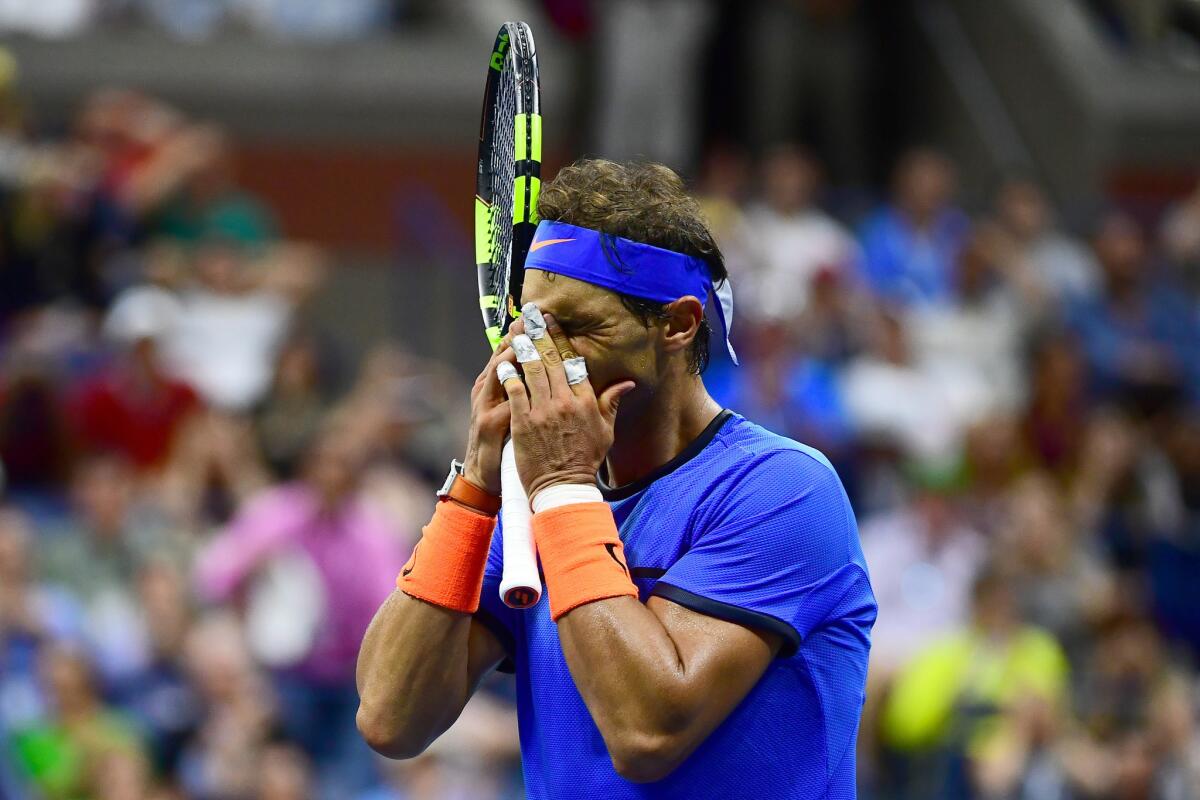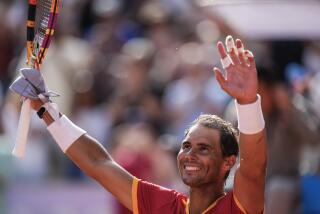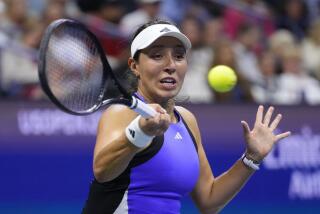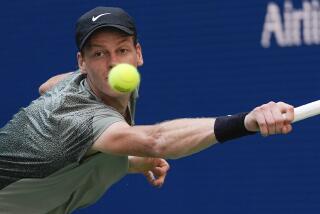Rafael Nadal falls in a French revolution at the U.S. Open

- Share via
Welcome to the French Open.
Three French players, Gael Monfils, Jo-Wilfried Tsonga and Lucas Pouille, had the opportunity to advance to the men’s quarterfinals at the U.S. Open on Sunday and all reached their destination in style, none more spectacularly than Pouille, who defeated No. 4-seeded Rafael Nadal of Spain.
Pouille was down a service break in the fifth set of the fourth-round match, fought back to draw even and squandered three match points in the tiebreaker before winning it on his fourth, firing a brave forehand crosscourt winner to wrap up a 6-1, 2-6, 6-4, 3-6, 7-6 (6) victory in 4 hours 7 minutes.
He rolled on his back in celebration and later talked about his rush of emotion, playing on the Arthur Ashe Stadium court for the first time. “I couldn’t dream better than this,” Pouille said in his on-court interview.
He has won three consecutive five-set matches. This is the first time three French players are in the quarterfinals of a Grand Slam event since the 1947 French Open. Earlier, No. 10 Monfils beat Marcos Baghdatis of Cyprus, 6-3, 6-2, 6-3, and No. 9 Tsonga eliminated the final American on the men’s side, Jack Sock, 6-3, 6-3, 6-7 (7), 6-2.
“I take pride in being the last one here,” Sock said.
Pouille will face Monfils in one quarterfinal, and Tsonga will play No. 1-ranked Novak Djokovic of Serbia, who defeated unseeded Kyle Edmund of Britain, 6-2, 6-1, 6-4.
Nadal-Pouille hoarded Sunday’s drama in one of the best matches of the tournament.
“I think it was the best atmosphere I played on a center court,” Pouille said. “At the end, it was full. Sometimes I couldn’t even hear myself when I was saying, ‘Allez, allez, allez.’”
A gutted Nadal trudged off the court — but, true to his classy nature, he signed some autographs on the way out. Tiebreakers in decisive sets have not been kind to him, of late. Nadal lost to Juan Martin del Potro of Argentina in the semifinals at the Olympics in Rio de Janeiro, leaving it all out there in a third-set tiebreaker.
“I didn’t play in Roland Garros. I didn’t play in Wimbledon,” said Nadal, who had been dealing with an injured wrist. “That’s opportunities lost. Here again, another opportunity lost.
“We can find stories, but I lost. That’s the only thing that really matters now. . . . Is a defeat. Is not the first one in my career, is not going to be the last.”
Nadal, 30, objected to one specific narrative, that he felt “pressure” at the Grand Slams.
“After winning 14 [majors] and being in the semifinals a lot of times, you feel that’s pressure?” he said, dismissing the question.
Not as easy to dismiss was the relatively routine forehand Nadal missed at 6-6 in the fifth-set tiebreak.
“Was big mistake,” Nadal said. “But you are 6-6 in the tiebreak. I played the right point. . . . You cannot go crazy thinking about these kinds of things, no?”
Said Pouille: “I couldn’t believe he would miss it. Even if he is one of the best, he feels the pressure.”
Pouille, 22, is far less experienced than, say, a player like Del Potro, who won the U.S. Open in 2009. But the Frenchman has the youthful, go-for-broke mentality working for him. This stage of a major isn’t unknown territory for him — Pouille made the Wimbledon quarterfinals this year — but this could be a career-changer. “I will tell you in a few months or in a few years,” Pouille said. “. . . Maybe it will change my career, but I will see. It will give me a lot of confidence for the next round, for the rest of the season.”
The U.S. Open is turning into a career-making event for one woman, Anastaija Sevastova of Latvia, and a revival for former No. 1 Caroline Wozniacki of Denmark. Wozniacki was at her counterpunching best in a 6-3, 6-4 victory over No. 8 Madison Keys, who struggled greatly with her service return and, overall, committed 33 unforced errors to Wozniacki’s seven.
“I don’t think I played well,” Keys said. “I don’t think I played smart, which is the biggest thing. And then I kind of let panic set in.”
Sevastova, 26, retired from tennis and came back about a year and a half ago. She said earlier in the tournament she felt like a C- or D-list celebrity in her native Latvia, but she beat Johanna Konta of Great Britain, 6-4, 7-5, in the fourth round and next faces Wozniacki.
“In Latvia, when you lose everybody always says, ‘You’re so bad.’ When you win everybody says, ‘You’re so good.’ I don’t know why we are like that. Maybe because we live next to big country, Russia.”
lisa.dillman@latimes.com
More to Read
Go beyond the scoreboard
Get the latest on L.A.'s teams in the daily Sports Report newsletter.
You may occasionally receive promotional content from the Los Angeles Times.











